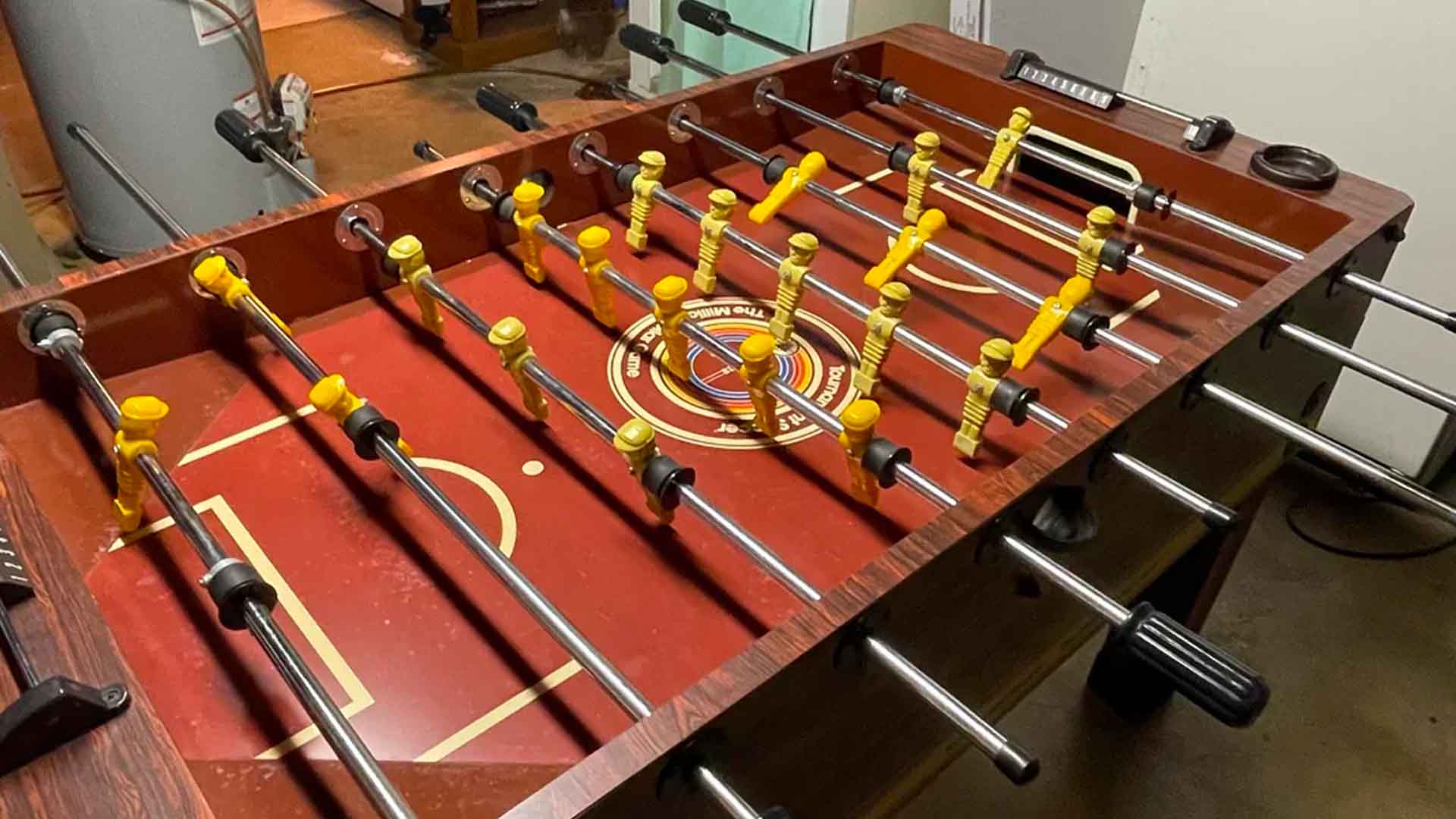What Is Foosball? Why Is It Called Foosball, and When Was It Invented?
Foosball, a beloved table sport, has become a cultural mainstay in various parts of the world. Known for its fast-paced and strategic gameplay, it mimics soccer on a miniature scale.
The game involves manipulating small figures attached to rotating bars to strike a ball into the opponent’s goal. Let’s dive into the rich history and global diversity of foosball, exploring its origins, styles, and cultural significance.
Decoding the Name: Foosball
Ever wondered why it’s called “foosball”? After all, it’s not exactly a name that immediately gives away the game’s concept.

Source: Wayfair
Foosball is believed to have originated in Germany, where it was known as “fussball” and later adapted into the English term “foosball.”
Foosball's Global Nicknames
Foosball’s different names around the world reflect its international popularity. The U.K. calls it “table football.” In France, it’s affectionately known as “baby foot,” and in Eastern Europe, it’s referred to as “kicker.” Spain opts for “futbolín.”

Source: Walmart
These diverse monikers not only show the game’s reach but also how different cultures have embraced and adapted it, making it a part of their leisure activities.
The Contested Origins of Foosball
The birth of foosball is shrouded in mystery and multiple claims. While Frenchman Lucien Rosengart, an automobile engineer, claimed it as his brainchild, Spanish citizen Alexandre de Fiesterra also staked a claim.

Source: onlineappliances/eBay
The only clear historical marker is the patent by Englishman Harold Searles Thornton in 1923, which closely resembles the modern game. These varied origin stories highlight the game’s broad appeal and the creative spirit of its early adopters.
The American Foosball Experience
American foosball is characterized by fast, power-driven gameplay. Played on dense, solid tables like mahogany, with thick plastic balls and harder plastic men, it emphasizes speed and strength.

Source: The Home Depot
The unique feature of three men on the goalie bar, unlike the single goalie in other styles, facilitates a dynamic play style, making the American version distinct and exciting.
The Elegance of French Foosball
In contrast to its American counterpart, French foosball focuses on controlled, strategic play. The linoleum playing surface and the cork ball enhance the game’s tactical aspect, encouraging players to focus on skillful passing and precise shot setups.

Source: Amazon
This style mirrors real football (or soccer) tactics, emphasizing the importance of strategy over brute force, offering a nuanced and refined approach to the game.
German Foosball: Precision and Strategy
German foosball tables are known for their softer play, which offers players ultimate control. The emphasis is on strategic gameplay, allowing players to carefully line up shots, much like a chess game.

Source: Amazon
The oversized goals on German tables further add to the unique playing experience, showcasing the diversity in playing styles that different cultures bring to foosball.
Italian Foosball: A Blend of Cultures
Italian foosball tables represent a fusion of various playing styles. Options like sandblasted glass or plastic laminate surfaces cater to preferences for either faster or more controlled gameplay.

Source: The Home Depot
This adaptability reflects the Italian approach to foosball, balancing speed with precision, and catering to a wide range of playing techniques.
Foosball's Rise in the U.S.
Foosball gained popularity in the United States thanks to Lawrence Patterson, an American service member who discovered the game in Germany. His introduction of coin-operated machines and the promotion of regional tournaments laid the foundation for its widespread appeal.

Source: Pinstackbowl
It was E. Lee Peppard, however, who truly made foosball a national sensation in the U.S. with his Tournament Soccer table and high-stakes tournaments.
The Million-Dollar Foosball Table
Foosball tables can be as lavish as they are fun. The Teckell Collection features crystal glass sides and playing surfaces with options like walnut accents and gold-plated handles.

Source: BroccoliCheeze/Reddit
Prices start at a staggering $7,500, soaring to figures not publicly disclosed. Such opulent tables transform a simple game into a symbol of luxury and refinement.
The World of Professional Foosball
Professional foosball is a realm of intense competition and skill. Governed by bodies like the International Table Soccer Federation, it features high-stakes tournaments with seasoned players competing for significant prizes.

Source: Pinstackbowl
This professional aspect adds a layer of seriousness to what many consider just a leisure activity, showcasing the game’s depth and the dedication of its players.
Foosball's Enduring Legacy
Despite its fluctuating popularity, foosball remains a cherished pastime across the globe. It’s not just a game — it’s a cultural phenomenon that brings together strategy, skill, and social interaction.

Source: Prince Arcades/Facebook
Foosball continues to evolve, with new styles and luxurious tables, ensuring its place in both casual and competitive circles for generations to come.
